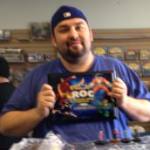 by Aaron Cantu
by Aaron Cantu
I have been having a lot of discussions lately with different people both locally and on the internet about the state of the game and the ways it is played. One thing that consistently works its way into the conversation at some point is the idea that there is a right and a wrong way to play the game. While I generally disagree with that view, I am here to talk about the way I play the game and the reasons I think it is beneficial.
BACKGROUND INFORMATION
Before getting into the core of this article, I think it is important to tell you a little bit about myself. I come from a small town. It’s economy is based largely on surrounding farms. I grew up playing sports. I started competing in wrestling at the age of 5, and I was often competing at age groups above me due to my size and my dad’s push to be competitive. When I got older, I was on a variety of different kinds of academic teams from math to quiz teams. No matter what I was doing, the goal was always the same. WIN. I didn’t really get into gaming until about 2004 when I found a local comic shop to kill time at in between classes in college. There wasn’t really anything around in my small community as far as gaming goes.
The first game I got into was the Yu-Gi-Oh! Trading card game (or TCG). At the time, I was working graveyard shift at a local Target store, and when I would get home, I would watch the TV show because I liked the animation style. When I found out it was a real game, I naturally wanted to get into it more. As I started playing the game, my brother and I, along with some of our friends, would play at home and I found myself wanting to win more and more. After a while, we decided it was time to go play in a tournament. We went in feeling very confident, and we went home licking our wounds as we got destroyed. After that, my brother and I went very different ways. He preferred to just play for fun in our home games. I wanted to try my luck at these tournaments again. I went to a local shop, started trading and playing different players. Thanks to my years of competing, I had the drive to practice and the ability to build strategies and learn quickly. Eventually, I became one of the top players in my local community. That didn’t last long.
Once I reached the point where I could consistently win tournaments or at least do well, I began to travel to other local comic/game stores. There, I learned about the existence of other TCGs, like Magic: The Gathering. I learned about the mythological hierarchy of collectible games. Pokemon was for kids and newbs. Yu-Gi-Oh! was a step up. Magic was King of the realms. There were also the low of the low, the table-top gamers. Like the dumb, young kid I was; I bought into this. I started learning other games, and in each case, I traveled along the same path as the one I took in Yu-Gi-Oh!.
One day, while visiting my friends at the comic store by campus, I saw a group of guys playing a game on a paper map. Normally, I would not have paid much attention, but I recognized the familiar pose of Spider-Man (I was a huge fan of the 90’s cartoon), and I was naturally intrigued. I asked about what they were playing, the group of guys jumped at the chance to teach me to play. They gave me a huge box of figures to keep. I started playing this game, and like the others, I dove in head first. As the years went on, I slowly moved away from other games. In 2015, I sold the last of my Magic collection to make a run at a World Championship. I came up short, losing in the Top 16, but I was very happy knowing that I was one of the top players in the world. That brings us to now.
COMPETITION
If you have made it this far, you have probably noticed that there is a consistent theme taking form this far, my desire to compete. It is something that has been wired into me since an early age. I genuinely enjoy competition. In my opinion, if something is easy to achieve, it tends to get boring very quickly. Boring games are often proves to be degenerative games and not healthy. Being competitive and playing to win gives me an end-goal, a reason to play; however, it’s probably not what you think.
To some, being competitive means only wanting to win, regardless of the cost. That’s not how I see it. Being competitive and playing to win area healthy thing. I have played many games. Different games require different skill-sets. They have different resources and methods of resource-gathering. One thing they all have in common, though, is that they all have terms for victory, and terms for defeat. While you can derive different things from playing a game (like fun), if you are playing a game, you are, by default, playing to win. This is a good thing. It gives all parties involved a mutual goal to work towards.
For me, I look at winning, as a way of knowing that I am constantly improving my skills. Winning IS fun. It’s not the only reason  I play games, but it is one of the things that makes them fun for me. I have the chance to put my theory to test against yours. One of us is going to win, and one of us is going to lose. When I play, I am aiming to impose my will on you on the map. If I control the board, I win the game. If I can do this consistently, that means that I am improving my game. I have talked about this on my podcast, Two Clicks from KO, a few times. After doing so, a listener turned me on to a book written by David Sirlin called “Playing to Win”. One passage stuck out to me the most and closely aligned with what I believe. In his book, Sirlin writes:
I play games, but it is one of the things that makes them fun for me. I have the chance to put my theory to test against yours. One of us is going to win, and one of us is going to lose. When I play, I am aiming to impose my will on you on the map. If I control the board, I win the game. If I can do this consistently, that means that I am improving my game. I have talked about this on my podcast, Two Clicks from KO, a few times. After doing so, a listener turned me on to a book written by David Sirlin called “Playing to Win”. One passage stuck out to me the most and closely aligned with what I believe. In his book, Sirlin writes:
“In pursuing the path of winning, you are likely to learn that concentrating merely on beating the opponent is not enough. In the long run, you will have to improve yourself, always, or you will be surpassed. The actual conflict appears to be between you and the opponents, but the best way to win is to bring to the table a mastery of playing to win and a mastery of the game at hand. These things are developed within you, and revealed to others only during conflict.”
“I PLAY FOR FUN.”
I realize that some people feel like they “just aren’t that competitive.” That is just fine. You don’t have to be. You can play the game just for fun. Many people do. However, I feel like it is important to keep in mind that “fun” is a subjective term. To me, winning is fun. Does that mean that I only have fun when I win? No. But it does mean that my goal is to win. That is when I have the most fun, and that is one reason why I play to win. It is one reason I collect “powerful” pieces and one reason I build “high-level” teams. While I do enjoy sealed play or casual games from time to time, my favorite way to play is in a tournament environment.
Heroclix is a game that allows different players to bring different forces to an event. If you are going to an event, especially a high level event, you would be wise to assume all players have equal access to all figures. It is also wise to assume that players there are there with the same goal in mind, win.
I have seen and heard people write and say things like, “….this game is not about players winning. It is about fans wanting to see what happens when the Avengers face off against the Justice League, or other scenarios like that.” While there can certainly be some truth to this, it isn’t a fact. The first time I went to Gen Con in 2014, I beat a person who was playing a Silver Centurion team that was a Stark Industries theme team with Splitlip and the Book of Skulls. These were all very strong game elements at the time. Both during and after the game, he blew up yelling at me because I won without “playing the game the way it should be played,” all the while maintaining that he was “playing for fun.” He took issue that I mixed both DC and Marvel pieces and wasn’t playing a theme team. He didn’t seem to understand that I was also playing for fun, but his definition of fun probably isn’t the same as mine.
The problem with the mentality that game should be played a specific way is that the game already has some clearly defined rules. The rules are universal for everyone playing the game. When you start adding personal restrictions or made up rules, then you and I are no longer playing the same game. You are playing your game, and I am playing mine. We just happen to be occupying the same space. The real problem with fun is that it isn’t clearly defined within the game. Winning is, it is clear and it is absolute. It isn’t fair for me to expect you to play the game the same way I do, but it is fair for me to assume that we are both playing to win.
WINNING ISN’T EVERYTHING
While winning is clear and absolute, it is not everything. While winning consistently is a way to measure your success or improvement in the game, it is still important to listen to the opinions of others. Listening to others will keep you honest about your self-assessment of your skills. If I go to a local tournament every week and win every week with the most powerful force I can think of while others are not playing with the same set of rules as I am, it is not an accurate assessment of whether I am growing my skill-set.
When recalling a game, I can’t recall clearly many games that I have won, but I can recall games that I lost. This is probably because I learn more from losing than winning. I learn about different strategies that have beaten mine. I learn about holes in my strategic theories. It keeps me humble. But most of all. it proves that others are playing to win, even when they don’t realize it themselves. I genuinely enjoy losing a closely contested battle. After, I enjoy discussing the game and theorizing about different things that could have happened in the game. It brings me closer with my community of players, which is important for the growth of the game. So, while playing to win is the goal, losing is also a good thing.
HOW DO I PLAY TO WIN
On my podcast, I get asked often about playing to win. A long-time listener once asked the question about how he can break free from his mental constructs of how the game should be played (he tends to only want to build theme teams) and start playing to win. While it is a good question, it isn’t the question he should have been asking.
Before you can begin playing to win, you have to ask yourself if you REALLY want to play to win, or if you want to play for some other reason. Playing to win involves time investment (studying dials, rules etc.). It requires resource gathering (collecting figures, maps, etc.). It is a multifaceted investment, and it isn’t for everyone. You need to decide what you want to get out of the game. If you just want to have some games and every once in a while win a monthly OP kit LE, it would be reckless of me to suggest you put more into okaying to win. You probably have sufficient fun playing with what you already have and with what you already put into the game.
If you truly want to play to win, the first thing you need to do is network. The Heroclix community is one of the best gaming communities by far. People are really genuine (for the most part) and helpful. Networking has many advantages. You can pool resources (have a community figure collection). You can crowd-fund trips by sharing travel costs. You can bounce strategies off each other and help iron out wrinkles in your game. Just remember that you need to network with people that have similar goals in mind.
You need to travel. Traveling allows you to experience different types of meta-games. One area may see an abundance of ranged combat strategies while another sees an overflow of close combat teams. It is important to learn multiple strategies so that when you run into the, you know what to expect. It also keeps you honest about where your skills are at in their development.
Lastly, you need to have fun. If you are not having fun, you are probably not doing this for a good reason. Playing to win is still “playing”. You are playing a game. You are spending time with people you like. Even if you don’t win the event, If you are playing to win, making friends, and enjoying yourself, then you are doing something right.




Great article ,very well said sir !